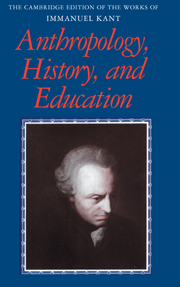Book contents
- Frontmatter
- Contents
- General editors' preface
- Preface
- General introduction
- 1 Observations on the feeling of the beautiful and sublime (1764)
- 2 Essay on the maladies of the head (1764)
- 3 Review of Moscati's work Of the corporeal essential differences between the structure of animals and humans (1771)
- 4 Of the different races of human beings (1775)
- 5 Essays regarding the Philanthropinum (1776/1777)
- 6 A note to physicians (1782)
- 7 Idea for a universal history with a cosmopolitan aim (1784)
- 8 Review of J. G. Herder's Ideas for the philosophy of the history of humanity. Parts 1 and 2 (1785)
- 9 Determination of the concept of a human race (1785)
- 10 Conjectural beginning of human history (1786)
- 11 Some remarks on Ludwig Heinrich Jakob's Examination of Mendelssohn's Morning hours (1786)
- 12 On the philosophers' medicine of the body (1786)
- 13 On the use of teleological principles in philosophy (1788)
- 14 From Soemmerring's On the organ of the soul (1796)
- 15 Anthropology from a pragmatic point of view (1798)
- 16 Postscript to Christian Gottlieb Mielcke's Lithuanian–German and German–Lithuanian dictionary (1800)
- 17 Lectures on pedagogy (1803)
- Editorial notes
- Glossary
- Bibliography
- Index
General introduction
Published online by Cambridge University Press: 05 May 2013
- Frontmatter
- Contents
- General editors' preface
- Preface
- General introduction
- 1 Observations on the feeling of the beautiful and sublime (1764)
- 2 Essay on the maladies of the head (1764)
- 3 Review of Moscati's work Of the corporeal essential differences between the structure of animals and humans (1771)
- 4 Of the different races of human beings (1775)
- 5 Essays regarding the Philanthropinum (1776/1777)
- 6 A note to physicians (1782)
- 7 Idea for a universal history with a cosmopolitan aim (1784)
- 8 Review of J. G. Herder's Ideas for the philosophy of the history of humanity. Parts 1 and 2 (1785)
- 9 Determination of the concept of a human race (1785)
- 10 Conjectural beginning of human history (1786)
- 11 Some remarks on Ludwig Heinrich Jakob's Examination of Mendelssohn's Morning hours (1786)
- 12 On the philosophers' medicine of the body (1786)
- 13 On the use of teleological principles in philosophy (1788)
- 14 From Soemmerring's On the organ of the soul (1796)
- 15 Anthropology from a pragmatic point of view (1798)
- 16 Postscript to Christian Gottlieb Mielcke's Lithuanian–German and German–Lithuanian dictionary (1800)
- 17 Lectures on pedagogy (1803)
- Editorial notes
- Glossary
- Bibliography
- Index
Summary
The present volume in The Cambridge Edition of the Works of Immanuel Kant in Translation differs from all of the other volumes in the series in that it is not devoted solely to one major work of Kant (e.g., Critique of Pure Reason, Critique of the Power of Judgment), does not focus on writings from a specific period of his writing career (e.g., Theoretical Philosophy, 1755–70; Opus postumum), is not confined to one specific subfield or area of his philosophy (e.g., Practical Philosophy, Religion and Rational Theology), and does not focus on a distinct genre of writing or mode of presentation (e.g., Correspondence, Lectures on Metaphysics, Lectures on Ethics). At the same time, Anthropology, History, and Education is no mere miscellany of occasional pieces that stands awkwardly outside of Kant's central philosophical concerns. Rather, these writings (whose original publication dates span thirty-nine years of Kant's life) are linked together by their central focus on human nature – the most pervasive and persistent theme in all of Kant's writings. Kant repeatedly claimed that the question “What is the human being?” should be philosophy's most fundamental concern (Jäsche Logic 9: 25; cf. letter to Stäudlin of May 4, 1793, 11: 429, Metaphysik Pölitz 28: 533–4), and over the years he approached the question from a variety of different perspectives. In addition to addressing this question indirectly under the guises of metaphysics, moral philosophy, and philosophy of religion, Kant broached the question directly in his extensive work on anthropology, history, and education gathered in the present volume.
- Type
- Chapter
- Information
- Anthropology, History, and Education , pp. 1 - 17Publisher: Cambridge University PressPrint publication year: 2007
- 2
- Cited by

